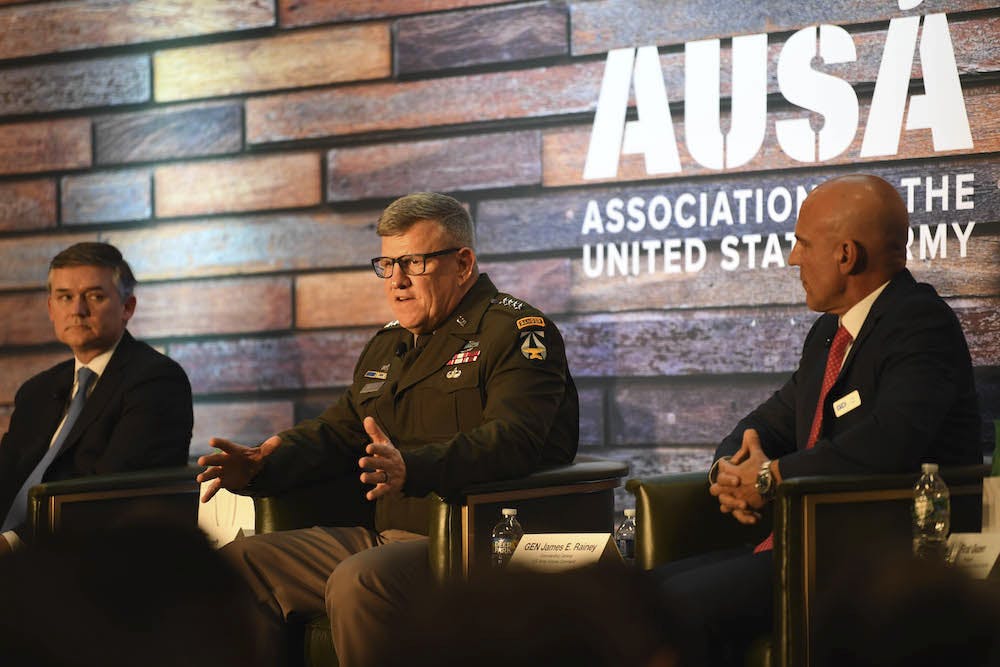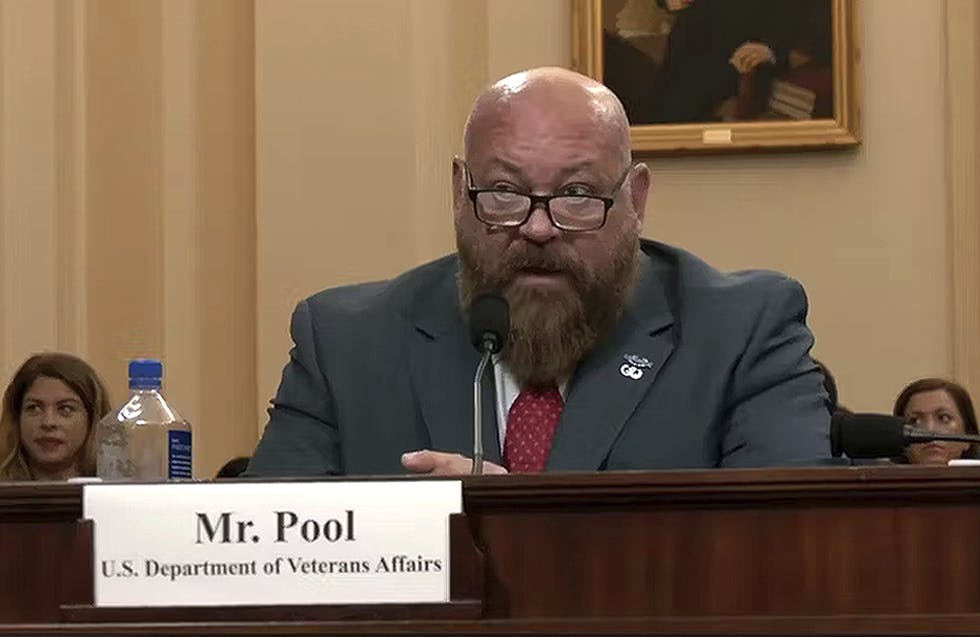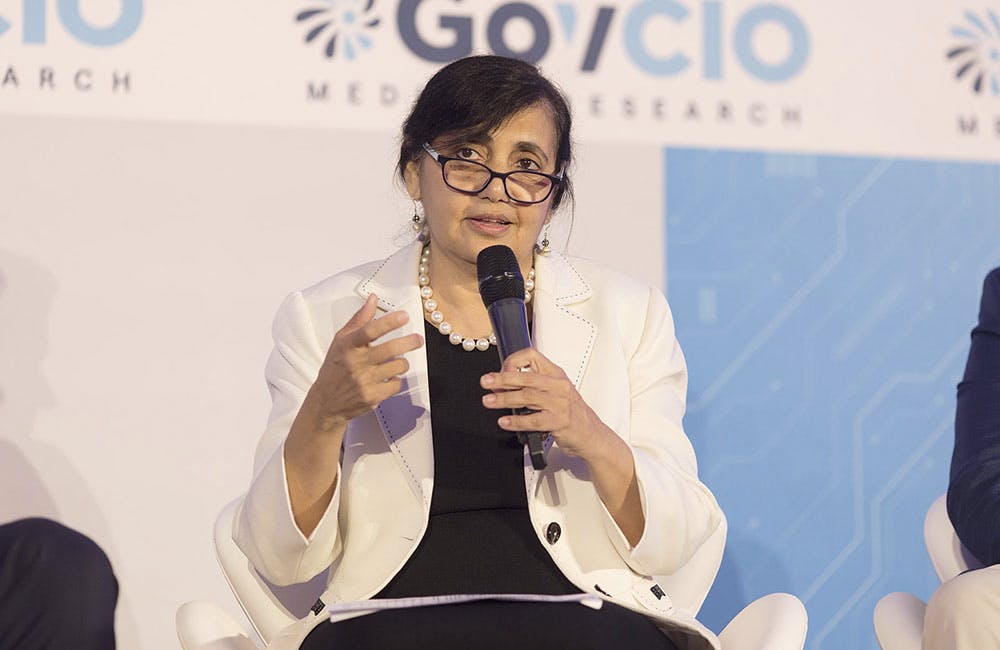Army Leaders: The Future Force Will Be Tech-Savvy
AI and other technologies will enable military personnel to be better warfighters.

Six years into the Army’s modernization plan, the service’s leaders are deliberating on how to fully integrate emerging technology like artificial intelligence into the battlefield.
Transformation and IT modernization were key themes at this year’s AUSA’s Annual Meeting and Exposition, where Gen. James Rainey, commanding general of the Army Futures Command, said “deliberate modernization” of the service is progressing, reducing timelines and sticking to initial priorities.
Rainey warned that there are “fundamental changes to warfare coming” on the horizon, and the time for the Army to adjust and adapt to them is now. According to Rainey, the Army’s command-and-control warfighting system needs to be ready to integrate emerging technologies that have the “potential to be incredibly disruptive” — like AI, machine learning, large language models and quantum computing — as soon as possible ahead of 2040.
Rainey said modernization has created opportunities for the Army to observe technology use cases in emerging hotspots like Ukraine and Israel, allowing the Army to turn those observations into “real capability in our formations.”
Rainey said that while the Army will still be able to adapt to technology as it arrives, it will require “commanders who are as good at leveraging technology as they are at reading terrain, doing combined arms maneuver and understanding the enemy.”
Army Acquisition, Logistics and Technology Assistant Secretary Douglas Bush said at the event that Congress’ support and flexibility has allowed the Army to acquire better technology on a faster scale, but added that congressional oversight is still very necessary to keep priorities in line.
Bush said mechanisms are being put in place to build government capacity to “understand AI and work with industry to evaluate it and field it quickly. There’s a government responsibility to understand what we’re buying and what we’re deploying, especially with a new technology that potentially is so transformational.”
Bush stated that the Army is taking steps to build its institutional knowledge of emerging technologies through efforts such as rotating officers with private industry to better understand how private industry tech can integrate with the Army.
However, Rainey believes that while the Army can build up its knowledge and understanding of AI and other emerging technologies, it shouldn’t try to compete with private industry.
“I think industry is always going to be better at and ahead of the Army and the military on AI,” Rainey said. “I think as we design the command-and-control warfighting system of the future that we need to get not one company, not vendor lock, but we need to get a handful of cutting edge companies integrated into that system as a service doing AI, doing ML, and making sure that we are always one step ahead of the enemy and we’re being predictive.”
This is a carousel with manually rotating slides. Use Next and Previous buttons to navigate or jump to a slide with the slide dots
-

Opinion: Original Intelligence Is the Missing Piece for AI Transformation
Limitations of AI agents and development drive growing needs for workforce development and "original intelligence."
3m read -

VA CIO Targets Modern IT and Smarter Workforce Alignment
Agency leaders told lawmakers they are focused on trimming legacy systems and restructuring its workforce to streamline operations.
3m read -

Pentagon's $200M AI Contracts Signal Broader Effort to Transform Talent
The Army is leveraging Silicon Valley, reservist programs and new hiring strategies to integrate critical digital skills in its ranks.
5m read -

AI Foundations Driving Government Efficiency
Federal agencies are modernizing systems, managing risk and building trust to scale responsible AI and drive government efficiency.
43m watch -

Inside DOD’s Push to Grow the Cyber Workforce Through Academia
Diba Hadi gives her first interview since becoming principal director of the DOD’s Cyber Academic Engagement Office.
15m listen -

Agencies Tackle Infrastructure Challenges to Drive AI Adoption
Federal agencies are rethinking data strategies and IT modernization to drive mission impact and operational efficiency as new presidential directives guide next steps.
5m read Partner Content -

Generative AI Demands Federal Workforce Readiness, Officials Say
NASA and DOI outline new generative AI use cases and stress that successful AI adoption depends on strong change management.
6m read -

The Next AI Wave Requires Stronger Cyber Defenses, Data Management
IT officials warn of new vulnerabilities posed by AI as agencies continue to leverage the tech to boost operational efficiency.
5m read -

Federal CIOs Push for ROI-Focused Modernization to Advance Mission Goals
CIOs focus on return on investment, data governance and application modernization to drive mission outcomes as agencies adopt new tech tools.
4m read -

Fed Efficiency Drive Includes Code-Sharing Law, Metahumans
By reusing existing code instead of rewriting it, agencies could dramatically cut costs under the soon-to-be-enacted SHARE IT Act.
5m read -

Data Transparency Essential to Government Reform, Rep. Sessions Says
Co-Chair of the Congressional DOGE Caucus Rep. Pete Sessions calls for data sharing and partnerships to reduce waste and improve efficiency.
5m read -

DOD Turns to Skills-Based Hiring to Build Next-Gen Cyber Workforce
Mark Gorak discusses DOD’s efforts to build a diverse cyber workforce, including skills-based hiring and partnerships with over 480 schools.
20m listen
















